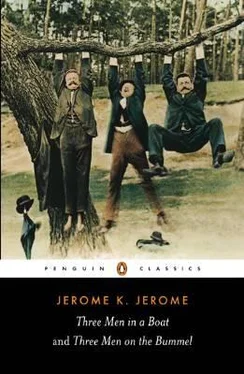Jerome Jerome - Three Men on the Bummel
Здесь есть возможность читать онлайн «Jerome Jerome - Three Men on the Bummel» весь текст электронной книги совершенно бесплатно (целиком полную версию без сокращений). В некоторых случаях можно слушать аудио, скачать через торрент в формате fb2 и присутствует краткое содержание. Жанр: Юмористическая проза, на английском языке. Описание произведения, (предисловие) а так же отзывы посетителей доступны на портале библиотеки ЛибКат.
- Название:Three Men on the Bummel
- Автор:
- Жанр:
- Год:неизвестен
- ISBN:нет данных
- Рейтинг книги:4 / 5. Голосов: 1
-
Избранное:Добавить в избранное
- Отзывы:
-
Ваша оценка:
- 80
- 1
- 2
- 3
- 4
- 5
Three Men on the Bummel: краткое содержание, описание и аннотация
Предлагаем к чтению аннотацию, описание, краткое содержание или предисловие (зависит от того, что написал сам автор книги «Three Men on the Bummel»). Если вы не нашли необходимую информацию о книге — напишите в комментариях, мы постараемся отыскать её.
Three Men on the Bummel — читать онлайн бесплатно полную книгу (весь текст) целиком
Ниже представлен текст книги, разбитый по страницам. Система сохранения места последней прочитанной страницы, позволяет с удобством читать онлайн бесплатно книгу «Three Men on the Bummel», без необходимости каждый раз заново искать на чём Вы остановились. Поставьте закладку, и сможете в любой момент перейти на страницу, на которой закончили чтение.
Интервал:
Закладка:
If you lose yourself, he finds you; and if you lose anything belonging to you, he recovers it for you. If you don't know what you want, he tells you. If you want anything that is good for you to have, he gets it for you. Private lawyers are not needed in Germany. If you want to buy or sell a house or field, the State makes out the conveyance. If you have been swindled, the State takes up the case for you. The State marries you, insures you, will even gamble with you for a trifle.
"You get yourself born," says the German Government to the German citizen, "we do the rest. Indoors and out of doors, in sickness and in health, in pleasure and in work, we will tell you what to do, and we will see to it that you do it. Don't you worry yourself about anything."
And the German doesn't. Where there is no policeman to be found, he wanders about till he comes to a police notice posted on a wall. This he reads; then he goes and does what it says.
I remember in one German town-I forget which; it is immaterial; the incident could have happened in any-noticing an open gate leading to a garden in which a concert was being given. There was nothing to prevent anyone who chose from walking through that gate, and thus gaining admittance to the concert without paying. In fact, of the two gates quarter of a mile apart it was the more convenient. Yet of the crowds that passed, not one attempted to enter by that gate. They plodded steadily on under a blazing sun to the other gate, at which a man stood to collect the entrance money. I have seen German youngsters stand longingly by the margin of a lonely sheet of ice. They could have skated on that ice for hours, and nobody have been the wiser. The crowd and the police were at the other end, more than half a mile away, and round the corner. Nothing stopped their going on but the knowledge that they ought not. Things such as these make one pause to seriously wonder whether the Teuton be a member of the sinful human family or not. Is it not possible that these placid, gentle folk may in reality be angels, come down to earth for the sake of a glass of beer, which, as they must know, can only in Germany be obtained worth the drinking?
In Germany the country roads are lined with fruit trees. There is no voice to stay man or boy from picking and eating the fruit, except conscience. In England such a state of things would cause public indignation. Children would die of cholera by the hundred. The medical profession would be worked off its legs trying to cope with the natural results of over-indulgence in sour apples and unripe walnuts. Public opinion would demand that these fruit trees should be fenced about, and thus rendered harmless. Fruit growers, to save themselves the expense of walls and palings, would not be allowed in this manner to spread sickness and death throughout the community.
But in Germany a boy will walk for miles down a lonely road, hedged with fruit trees, to buy a pennyworth of pears in the village at the other end. To pass these unprotected fruit trees, drooping under their burden of ripe fruit, strikes the Anglo-Saxon mind as a wicked waste of opportunity, a flouting of the blessed gifts of Providence.
I do not know if it be so, but from what I have observed of the German character I should not be surprised to hear that when a man in Germany is condemned to death he is given a piece of rope, and told to go and hang himself. It would save the State much trouble and expense, and I can see that German criminal taking that piece of rope home with him, reading up carefully the police instructions, and proceeding to carry them out in his own back kitchen.
The Germans are a good people. On the whole, the best people perhaps in the world; an amiable, unselfish, kindly people. I am positive that the vast majority of them go to Heaven. Indeed, comparing them with the other Christian nations of the earth, one is forced to the conclusion that Heaven will be chiefly of German manufacture. But I cannot understand how they get there. That the soul of any single individual German has sufficient initiative to fly up by itself and knock at St. Peter's door, I cannot believe. My own opinion is that they are taken there in small companies, and passed in under the charge of a dead policeman.
Carlyle said of the Prussians, and it is true of the whole German nation, that one of their chief virtues was their power of being drilled. Of the Germans you might say they are a people who will go anywhere, and do anything, they are told. Drill him for the work and send him out to Africa or Asia under charge of somebody in uniform, and he is bound to make an excellent colonist, facing difficulties as he would face the devil himself, if ordered. But it is not easy to conceive of him as a pioneer. Left to run himself, one feels he would soon fade away and die, not from any lack of intelligence, but from sheer want of presumption.
The German has so long been the soldier of Europe, that the military instinct has entered into his blood. The military virtues he possesses in abundance; but he also suffers from the drawbacks of the military training. It was told me of a German servant, lately released from the barracks, that he was instructed by his master to deliver a letter to a certain house, and to wait there for the answer. The hours passed by, and the man did not return. His master, anxious and surprised, followed. He found the man where he had been sent, the answer in his hand. He was waiting for further orders. The story sounds exaggerated, but personally I can credit it.
The curious thing is that the same man, who as an individual is as helpless as a child, becomes, the moment he puts on the uniform, an intelligent being, capable of responsibility and initiative. The German can rule others, and be ruled by others, but he cannot rule himself. The cure would appear to be to train every German for an officer, and then put him under himself. It is certain he would order himself about with discretion and judgment, and see to it that he himself obeyed himself with smartness and precision.
For the direction of German character into these channels, the schools, of course, are chiefly responsible. Their everlasting teaching is duty. It is a fine ideal for any people; but before buckling to it, one would wish to have a clear understanding as to what this "duty" is. The German idea of it would appear to be: "blind obedience to everything in buttons." It is the antithesis of the Anglo-Saxon scheme; but as both the Anglo-Saxon and the Teuton are prospering, there must be good in both methods. Hitherto, the German has had the blessed fortune to be exceptionally well governed; if this continue, it will go well with him. When his troubles will begin will be when by any chance something goes wrong with the governing machine. But maybe his method has the advantage of producing a continuous supply of good governors; it would certainly seem so.
As a trader, I am inclined to think the German will, unless his temperament considerably change, remain always a long way behind his Anglo-Saxon competitor; and this by reason of his virtues. To him life is something more important than a mere race for wealth. A country that closes its banks and post-offices for two hours in the middle of the day, while it goes home and enjoys a comfortable meal in the bosom of its family, with, perhaps, forty winks by way of dessert, cannot hope, and possibly has no wish, to compete with a people that takes its meals standing, and sleeps with a telephone over its bed. In Germany there is not, at all events as yet, sufficient distinction between the classes to make the struggle for position the life and death affair it is in England. Beyond the landed aristocracy, whose boundaries are impregnable, grade hardly counts. Frau Professor and Frau Candlestickmaker meet at the Weekly Kaffee-Klatsch and exchange scandal on terms of mutual equality. The livery-stable keeper and the doctor hobnob together at their favourite beer hall. The wealthy master builder, when he prepares his roomy waggon for an excursion into the country, invites his foreman and his tailor to join him with their families. Each brings his share of drink and provisions, and returning home they sing in chorus the same songs. So long as this state of things endures, a man is not induced to sacrifice the best years of his life to win a fortune for his dotage. His tastes, and, more to the point still, his wife's, remain inexpensive. He likes to see his flat or villa furnished with much red plush upholstery and a profusion of gilt and lacquer. But that is his idea; and maybe it is in no worse taste than is a mixture of bastard Elizabethan with imitation Louis XV, the whole lit by electric light, and smothered with photographs. Possibly, he will have his outer walls painted by the local artist: a sanguinary battle, a good deal interfered with by the front door, taking place below, while Bismarck, as an angel, flutters vaguely about the bedroom windows. But for his Old Masters he is quite content to go to the public galleries; and "the Celebrity at Home" not having as yet taken its place amongst the institutions of the Fatherland, he is not impelled to waste his, money turning his house into an old curiosity shop.
Читать дальшеИнтервал:
Закладка:
Похожие книги на «Three Men on the Bummel»
Представляем Вашему вниманию похожие книги на «Three Men on the Bummel» списком для выбора. Мы отобрали схожую по названию и смыслу литературу в надежде предоставить читателям больше вариантов отыскать новые, интересные, ещё непрочитанные произведения.
Обсуждение, отзывы о книге «Three Men on the Bummel» и просто собственные мнения читателей. Оставьте ваши комментарии, напишите, что Вы думаете о произведении, его смысле или главных героях. Укажите что конкретно понравилось, а что нет, и почему Вы так считаете.










